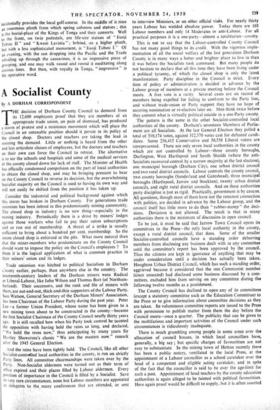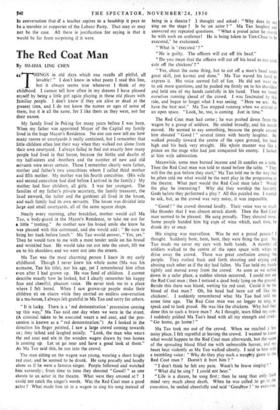A Socialist County
By A DURHAM CORRESPONDENT i Consider the industrial and political background against which this storm has broken in Durham County. For generations trade unionism has been inbred in this predominantly mining community. The closed shop in industry is no new thing—especially in the mining industry. Periodically there is a drive by miners' lodges against those workers who fail to pay their union subscriptions and so run out of membership. A threat of a strike is usually sufficient to bring about a hundred per cent. membership. So the union closed shop is enforced at the pits. What more natural than that the miner-members who predominate on the County Council should want to impose the policy on the Council's employees ? To them it is the logical application of what is common practice in their miners' union and its lodges.
Trade unionism was hitched to political Socialism in Durham County earlier, perhaps, than anywhere else in the country. The nineteenth-century leaders of the Durham miners were Radical or Liberal-Labour, like John Wilson and Thomas Burt (of Northum- berland). Their successors, and the rank and file of miners with them, are out-and-out, thick-and-thin supporters of the Labour Party. Sam Watson, General Secretary of the Durham Miners' Association, has been Chairman of the Labour Party during the past year. Peter Lee—a former Union President, whose name has been given to a new mining town about to be constructed in the county—became the first Socialist Chairman of the County Council nearly thirty years ago. It is still recalled how when his Party took control he taunted the opposition with having held the reins so long, and declared, " We hold the reins now," thus anticipating by many years Sir Hartley Shawcross's classic "We are the masters now," remark after the 1945 General Election.
And the reins have been tightly held. The Council, like all other Socialist-controlled local authorities in the county, is run on strictly Party lines. All committee chairmanships were taken over by the Party. Non-Socialist aldermen were turned out as their term of office expired and their places filled by Labour aldermen. Every Position of importance in the Council is filled by a Socialist. Save in very rare circumstances, none but Labour members are appointed as delegates to the many conferences that are attended, or sent
to interview Ministers, or on other official visits. For nearly thirty years Labour has wielded absolute power. Today there are 103 Labour members and only 14 Moderates or anti-Labour. For all practical purposes it is a one-party—almost a totalitarian—county.
This is not to say that the Labour-controlled County Council has not many good things to its credit. With the vigorous imple- mentation of all the social welfare of the last generation Durham County is in many ways a better and brighter place to live in than it was before the Socialists took command. But many people do not hesitate to declare that all this time they have been living under a political tyranny, of which the closed shop is only the latest manifestation. Party discipline in the Council is strict. Every item of policy or administration is decided in advance by the Labour group of members at a private meeting before the Council meets. A free vote is a rarity. Several cases are on record of members being expelled for failing to conform to the Party line, and without trade-union or Party support they have no hope of securing nomination or re-election later on. Men think twice before they commit what is virtually political suicide in a one-Party county.
The pattern is the same in the other Socialist-controlled local authorities of the county. Durham's seventeen Members of Parlia- ment are all Socialists. At the last General Election they polled a total of 510,174 votes, against 312,370 votes cast for defeated candi- dates. Some 256,415 Conservative and 50,538 Liberal voters are unrepresented. There are only seven local authorities in the county which are not controlled by Labour—three county boroughs, Darlington, West Hartlepool and South Shields (where the anti- Socialists recovered control by a narrow majority at the last election), one municipal borough (Durham City), one urban district council and two rural district councils. Labour controls the county council, two county boroughs (Sunderland and Gateshead), three municipal boroughs (Hartlepool, Jarrow and Stockton), twenty urban district councils, and eight rural district councils. And on these authorities party discipline is just as rigid. Practically, government is by caucus. All questions, though most of them have not the remotest connection with politics, are decided in advance by the Labour group, and the council itself has little more to do than " rubber-stamp " the deci- sions. Deviation is not allowed. The result is that in many authorities there is the minimum of discussion in open council.
To be just, it must be said that Jarrow Town Council opens its committees to the Press—the only local authority in the county, except a rural district council, that does. Some of the smaller Socialist-controlled councils have a standing order debarring members from disclosing any business dealt with in any committee until the committee's report has been approved by the council Thus the citizens are kept in ignorance of anything that may be under consideration until a decision has actually been taken. Houghton Urban District Council, which has such a standing ordbr, aggrieved because it considered that the one Communist member (since unseated) had disclosed some business discussed by a com- mittees, excluded him from serving on any committee during the following twelve months as a punishment.
The County Council has declined to open any of its committees (except a statutory committee such as the Education Committee) to the Press or to give information about committee decisions as they are taken. Its voluminous committee reports are issued to the Press with permission to publish matter from them the day before the Council meets—once a quarter. The publicity that can be given to the multifarious and important activities of the Council under such circumstances is ridiculously inadequate.
There is much grumbling among people in some areas over the allocation of council houses, in which local councillors have, generally, a big say ; but specific charges of favouritism are not easy to substantiate. In the mining town of Hetton recently there has been a public outcry, ventilated in the local Press, at the appointment of a Labour councilor as a school caretaker over the head of a competent and eligible acting caretaker, and in spite of the fact that the councillor is said to be over the age-limit for such a post. Appointment of head teachers by the county education authorities is again alleged to be tainted with political favouritism. Here again proof would be difficult to supply, but it is often asserted In conversation that -if a teacher aspires to a headship it pays to be a member or supporter of the Labour Party. That may or may not be the case. All there is justification for saying is that it would be far from surprising if it were.















































































 Previous page
Previous page